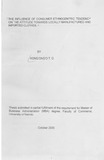| dc.contributor.author | Kong'ong'o, TO | |
| dc.date.accessioned | 2013-05-08T15:55:35Z | |
| dc.date.available | 2013-05-08T15:55:35Z | |
| dc.date.issued | 2000-10 | |
| dc.identifier.uri | http://erepository.uonbi.ac.ke:8080/xmlui/handle/123456789/20449 | |
| dc.description.abstract | This study focuses on the consumer ethnocentrism and its relationship with
attitude towards locally manufactured and imported products. It analyses
ethnocentrism as an innate component of every society and individual as a result
of their socialization and surrounding. The analysis of ethnocentrism is carried out
on the basis of both second hand and new locally manufactured products.
Attitude towards a product on the other hand is analyzed as the sum of attitude
towards it components following the multi attribute attitude model proposed by
Fishbein.The study confirms that:
a) Nairobi consumers have less than average ethnocentric scores on the
ethnocentrism scale. However they exhibit a greater level of ethnocentrism
with respect to new locally manufactured products.
b) Nairobi consumers have less positive attitude towards locally manufactured
clothes compared to both imported and second hand clothes, mainly because
they believe the product does not offer the right level of desired attributes.
c) There is a direct positive relationship between consumer ethnocentrism score
and attitude towards locally manufactured clothes. | en |
| dc.description.sponsorship | University of Nairobi | en |
| dc.language.iso | en | en |
| dc.subject | Consumer behaviour | en |
| dc.subject | Ethnocentric tendencies | en |
| dc.subject | Local manufacture | en |
| dc.subject | Imported clothing | en |
| dc.title | The influence of consumer ethnocentric tendency on the attitude towards locally manufactured and imported clothes | en |
| dc.type | Thesis | en |
| local.publisher | School of Business, University of Nairobi | en |

